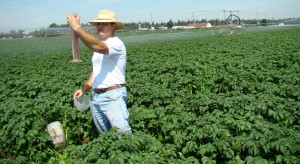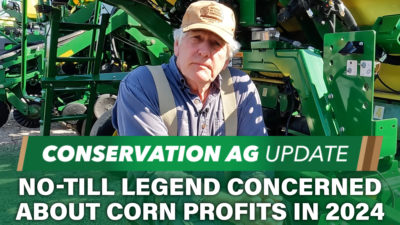By dryland standards, potato growers in Washington’s rainy Skagit County don’t irrigate much—only about five inches a year.
But thanks to conservation efforts, “those five inches mean a lot here,” said Don McMoran, director of Washington State University Skagit County Extension.
McMoran is working with Troy Peters, a scientist at WSU’s Irrigated Agriculture Research and Extension Center in Prosser, to help growers statewide use every drop of irrigation water to the fullest.
“Small improvements in irrigation efficiency can make a huge impact on water conservation,” said Peters.
Developed with a $455,000 grant from the U.S. Natural Resources Conservation Service, the Water Irrigation System Efficiency, or WISE, project educates farmers and gives them smart tools to help the environment and their bottom line.
“Farmers make their living from the land,” said McMoran. “They want to be good stewards by using water in the most efficient way possible. Dr. Peters and I are giving them the tools to do that.”

Washington State University Extension educator Don McMoran, above measuring irrigation water in the field, is helping growers save water, both in Skagit Valley’s potato fields, and statewide.
In a three-year project that began this year, McMoran and Peters are creating “Centers of Irrigation Excellence” throughout the state, with bases in Benton, Colville, Ferry, Lewis, Skagit and Spokane counties.
From these centers, Extension educators will conduct field visits and offer voluntary assessments to help growers see how their water use stacks up and tailor improvements to fit their farms. Growers can also get advice as well as technical consultations to help upgrade their equipment.
Thanks to Extension efforts, farmers in Skagit County have led the state in adoption of the WSU-developed mobile app, Irrigation Scheduler Mobile. A big part of WISE involves encouraging farmers to use the app to plan and monitor water use on the go.
“Most farmers used to use the ‘kick the dirt’ method,” McMoran said. “When they saw dust, that’s when they got out their irrigation equipment.”
Using WISE tools, Skagit growers found and plugged leaks and switched to irrigation at night, when it’s less windy.
“We found that if we do a better job of knowing when plants get stressed out, we can do a better job of keeping them alive,” McMoran said. “We make sure plants receive water or nutrients when they need them.”
Efficient pumps use less power, saving energy. Less irrigation runoff means that that fertilizers and pesticides stay in the field and don’t move into the water supply.
“Irrigation efficiency saves water, saves energy, preserves environmental quality, and ends up making the farmer more money,” said Peters. “Everybody wins.”
To take part, growers should contact their local WSU Extension agent.






Post a comment
Report Abusive Comment